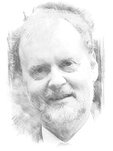- Herschel Hobbs - AA Hodge - Charles Hodge - Rex Humbard - Harley Hunt - Larry Hurtado -
==herschel herald hobbs== |
Herschel Harold Hobbs was a Baptist clergyman; denominational leader. Born– October 24, 1907, Coosa Co. Parents– Elbert Oscar and Octavia (Whatley) Hobbs. Married– Frances Jackson. Children– One. Education– Howard College, B.A., 1932; Southern Baptist Theological Seminary, M.Th., 1935, Ph.D., 1938. Ordained a Baptist minister, Birmingham, 1929. Pastor of churches in Birmingham, Montgomery, and Mobile, Ala., and in Alexandria, La., between 1929 and 1949. Pastor, First Baptist Church, Oklahoma City, Okla., 1949-1973. Member, Southern Baptist Convention Executive Committee and other committees and agencies; President, Southern Baptist Pastors Conference, Trustee, Southern Theological Seminary; and Oklahoma City Special Baptist Memorial Hospital Committee. President of Southern Baptist Convention for two terms; vice-president of Baptist World Alliance. Preacher for “The International Baptist Hour,”1958-1976. Honors– Honorary degrees from Howard College; William Jewell College; Oklahoma City University; John Brown University. Named to the Oklahoma Hall of Fame. Retired as pastor emeritus of Oklahoma City First Baptist Church, 1973. Died November 28, 1995.
|
June 16, 2021: Shawnee News Star: OBU presents Hobbs Award to Dr. David Manner
Oklahoma Baptist University presented the Herschel H. Hobbs Award for Distinguished Denominational Service to Dr. David Manner during the Southern Baptist Convention Annual Meeting in Nashville, Tennessee, June 14. Dec 2, 1995: New York Times: Herschel H. Hobbs, 88, Southern Baptist Leader Dr. Herschel Harold Hobbs, a former president of the Southern Baptist Convention and chairman of the committee that wrote the latest statement of church doctrine, died on Tuesday at Baptist Hospital in Oklahoma City. He was 88 and lived in Oklahoma City. |
Publication(s):
Basic Bible Sermons on John. Nashville; Broadway Press, 1990. Christ in You. Grand Rapids, Mich.; Baker Book House, 1963. Cowards or Conquerors. Valley Forge, Penn.; Judson Press, 1951. The Crucial Words from Calvary. Grand Rapids, Mich.; Baker Book House, 1958. The Epistles to the Corinthians, a Study Manual. Grand Rapids, Mich.; Baker Book House, 1960. Fundamentals of Our Faith. Nashville; Broadman Press, 1960. The Gospel of Giving. Nashville; Broadman Press, 1955. The Gospel of Matthew. Grand Rapids, Mich.; Baker Book House, 1961. Messages on the Resurrection. Grand Rapids, Mich.; Baker Book House, 1960. Moses’ Mighty Men. Nashville; Broadman Press, 1958. My Favority Illustrations. Nashville; Broadman Press, 1990. New Testament Evangelism. Nashville; Convention Press, 1960. Preaching Values from the Papyri. Grand Rapids, Mich.; Baker Book House, 1964. Space Age Religion; Sermons. Fort Worth, Tex.; Southern Baptists Radio and Television Commission, 1963. Studies in Hebrews. Nashville; Sunday School Board, Southern Baptist Convention, 1954. The Ten Commandments; Sermons on “The Baptist Hour.” Fort Worth, Tex.; Radio and Television Commission of the Southern Baptist Convention, 1961? The Victory of Faith; “Ten Best Baptist Hour Sermons of 1958-59.” Fort Worth, Tex.; Radio-Television Commission of the Southern Baptist Convention, 1959. Welcome Speeches, and Emergency Addresses for All Occasions. Grand Rapids, Mich.; Zondervan, 1960. What Baptists Believe. Nashville; Broadman Press, 1963. Who is This? Nashville; Broadman Press, 1952. You Are Chosen; the Priesthood of All Believers. San Francisco; Harper & Row, 1990. |
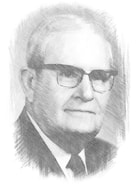 Herschel H Hobbs
Herschel H Hobbs
Why is it that those who believe in “the Son of man … lifted up” shall have eternal life? “For God so loved the world, that he gave his only begotten Son, that whosoever believeth in him should not perish [ … utterly being lost in hell], but have [ … keep on having] everlasting life” (vs. 16).
Who can enlarge upon this Gospel in a verse? It is called Everybody’s Text.” As indeed it is. Robertson calls it the “Little Gospel.” If the remainder of the Bible were lost and only this verse reserved, it contains enough gospel to save the whole human race! It tells us that God in love takes the initiative in salvation, that He saves through His Son, that this salvation is appropriated through faith in Him, and that those believing are saved to the uttermost of degree and time. And yet, probably fewer sermons are preached from this text than from any other of the more familiar ones. The reason being that when you quote it you have said it all. Explain it one may. But enlarge upon it one cannot. It is the gospel in superlatives.
It tells of the greatest reason for divine love (for), the original source of love (God), the greatest degree of love (so), the greatest emotion of love (loved), the greatest object of love (the world), the greatest relation of love (that), the greatest expression of love (he gave), the greatest gift of love (his only begotten Son), the greatest demand of love (that), the greatest recipients of love (whosoever), the greatest response to love (believeth in him), the greatest deliverance of love (should not perish), the greatest alternative of love (but), the greatest possession of love (have), the greatest quality and extent of love (everlasting), and the greatest fruit of love (life).-Hobbs, Herschel H., An Exposition Of The Four Gospels: Volume 4, The Gospel of John. Grand Rapids, MI: Baker Book House, page 85-86
Who can enlarge upon this Gospel in a verse? It is called Everybody’s Text.” As indeed it is. Robertson calls it the “Little Gospel.” If the remainder of the Bible were lost and only this verse reserved, it contains enough gospel to save the whole human race! It tells us that God in love takes the initiative in salvation, that He saves through His Son, that this salvation is appropriated through faith in Him, and that those believing are saved to the uttermost of degree and time. And yet, probably fewer sermons are preached from this text than from any other of the more familiar ones. The reason being that when you quote it you have said it all. Explain it one may. But enlarge upon it one cannot. It is the gospel in superlatives.
It tells of the greatest reason for divine love (for), the original source of love (God), the greatest degree of love (so), the greatest emotion of love (loved), the greatest object of love (the world), the greatest relation of love (that), the greatest expression of love (he gave), the greatest gift of love (his only begotten Son), the greatest demand of love (that), the greatest recipients of love (whosoever), the greatest response to love (believeth in him), the greatest deliverance of love (should not perish), the greatest alternative of love (but), the greatest possession of love (have), the greatest quality and extent of love (everlasting), and the greatest fruit of love (life).-Hobbs, Herschel H., An Exposition Of The Four Gospels: Volume 4, The Gospel of John. Grand Rapids, MI: Baker Book House, page 85-86
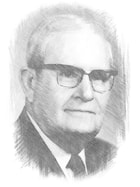 Herschel H Hobbs
Herschel H Hobbs
"The early Christians spoke to God before they spoke with men. They could meet the problems of life because they had first met with God." --Herschel H Hobbs
“The message of God is being beamed electronically across the boundaries of countries whose missionaries cannot go because of the rules of men. Electronic waves don’t need visas.”
--Herschel H Hobbs; 1972
“The message of God is being beamed electronically across the boundaries of countries whose missionaries cannot go because of the rules of men. Electronic waves don’t need visas.”
--Herschel H Hobbs; 1972
==charles hodge============
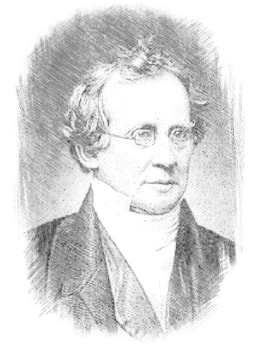 Charles Hodge
Charles Hodge
I beseech you, therefore, brethren, by the mercies of God, etc. As the sum of all that Paul had said of the justification, sanctification, and salvation of men is, that these results are to be attributed not to human merit nor to human efforts, but to the mercy of God, he brings the whole discussion to bear as a motive for devotion to God. Whatever gratitude the soul feels for pardon, purity, and the sure prospect of eternal life, is called forth to secure its consecration to that God who is the author of all these mercies.
That ye present your bodies a living sacrifice, holy, acceptable unto God. All the expressions of this clause seem to have an obvious reference to the services of the Old Testament economy. Under that dispensation, animals free from blemish were presented and devoted to God; under the new dispensation a nobler and more spiritual service is to be rendered; not the oblation of animals, but the consecration of ourselves. The expression, your bodies, is perhaps nearly equivalent to yourselves; yet Paul probably used it with design, not only because it was appropriate to the figure, but because he wished to render the idea prominent, that the whole man, body as well as soul, was to be devoted to the service of God. "Ye are bought with a price; therefore glorify God, in your body, and in your spirit, which are God's," 1 Corinthians 6:20. The apostle carries the figure out; the sacrifice is to be living, holy, and acceptable. The first of these epithets is generally considered as intended to express the contrast between the sacrifice here intended, and the victims which were placed lifeless upon the altar; thus believers, in 1 Peter 2:5, are called "living stones," in opposition to the senseless materials employed in a literal building. We are to present θυσίαν ζῶσαν, a sacrifice that lives. "Abominabile est, cadaver offere."—Bengel. The word living, however, may mean perpetual, lasting, never neglected; as in the phrases, "living bread," John 6:51, 'bread which never looses its power;' "living hope," 1 Peter 1:3, 'hope which never fails;' "living waters," "a living way," etc.; (see Wahl's Lexicon, under the word ζάω.) The sacrifice then which we are to make is not a transient service, like the oblation of a victim, which was in a few moments consumed upon the altar, but it is a living or perpetual sacrifice never to be neglected or recalled. The epithet holy has probably direct reference to the frequent use of a nearly corresponding word (תָּמִים) in the Hebrew scriptures, which, when applied to sacrifices, is commonly rendered without blemish. The word holy is then in this case equivalent to immaculate, i.e. free from those defects which would cause an offering to be rejected. The term acceptable is here used in the same sense as the phrase, "for a sweet smelling savor," Ephesians 5:2; Philippians 4:18; Leviticus 1:9, i.e. grateful, well-pleasing; a sacrifice in which God delights. Τῷ Θεῷ is to be connected with εὐάρεστον and not with παραστῆσαι.
Your reasonable service. There is doubt as to the grammatical construction of this clause. The most natural and simple explanation is to consider it in opposition with the preceding member of the sentence, as has been done by our translators, who supply the words which is. This consecration of ourselves to God, which the apostle requires, is a reasonable service. The word λοτρεία does not mean an offering, but worship. It is not the thing offered that is said to be reasonable in the sense of, endowed with reason, but the nature of the service. It is rendered by the mind. The word (λογικήν) rendered reasonable, is indeed variously explained. The simplest interpretation is that which takes the word in its natural sense, viz., pertaining to the mind; it is a mental or spiritual service, in opposition to ceremonial and external observations. Compare the phrase (λογικὸν γάλα) 'milk suited, or pertaining to the mind,' 1 Peter 2:2. Others understand these words as expressing the difference between the sacrifices under the Christian dispensation and those under the Old. Formerly animals destitute of reason (ἄλογα ζῶα) were offered unto God, but now men possessed of a rational soul. But this interpretation is neither so well suited to the meaning of the word, nor does it give a sense so consistent with the context; compare 1 Peter 2:5. --Charles Hodge; Commentary on the Epistle to the Romans
That ye present your bodies a living sacrifice, holy, acceptable unto God. All the expressions of this clause seem to have an obvious reference to the services of the Old Testament economy. Under that dispensation, animals free from blemish were presented and devoted to God; under the new dispensation a nobler and more spiritual service is to be rendered; not the oblation of animals, but the consecration of ourselves. The expression, your bodies, is perhaps nearly equivalent to yourselves; yet Paul probably used it with design, not only because it was appropriate to the figure, but because he wished to render the idea prominent, that the whole man, body as well as soul, was to be devoted to the service of God. "Ye are bought with a price; therefore glorify God, in your body, and in your spirit, which are God's," 1 Corinthians 6:20. The apostle carries the figure out; the sacrifice is to be living, holy, and acceptable. The first of these epithets is generally considered as intended to express the contrast between the sacrifice here intended, and the victims which were placed lifeless upon the altar; thus believers, in 1 Peter 2:5, are called "living stones," in opposition to the senseless materials employed in a literal building. We are to present θυσίαν ζῶσαν, a sacrifice that lives. "Abominabile est, cadaver offere."—Bengel. The word living, however, may mean perpetual, lasting, never neglected; as in the phrases, "living bread," John 6:51, 'bread which never looses its power;' "living hope," 1 Peter 1:3, 'hope which never fails;' "living waters," "a living way," etc.; (see Wahl's Lexicon, under the word ζάω.) The sacrifice then which we are to make is not a transient service, like the oblation of a victim, which was in a few moments consumed upon the altar, but it is a living or perpetual sacrifice never to be neglected or recalled. The epithet holy has probably direct reference to the frequent use of a nearly corresponding word (תָּמִים) in the Hebrew scriptures, which, when applied to sacrifices, is commonly rendered without blemish. The word holy is then in this case equivalent to immaculate, i.e. free from those defects which would cause an offering to be rejected. The term acceptable is here used in the same sense as the phrase, "for a sweet smelling savor," Ephesians 5:2; Philippians 4:18; Leviticus 1:9, i.e. grateful, well-pleasing; a sacrifice in which God delights. Τῷ Θεῷ is to be connected with εὐάρεστον and not with παραστῆσαι.
Your reasonable service. There is doubt as to the grammatical construction of this clause. The most natural and simple explanation is to consider it in opposition with the preceding member of the sentence, as has been done by our translators, who supply the words which is. This consecration of ourselves to God, which the apostle requires, is a reasonable service. The word λοτρεία does not mean an offering, but worship. It is not the thing offered that is said to be reasonable in the sense of, endowed with reason, but the nature of the service. It is rendered by the mind. The word (λογικήν) rendered reasonable, is indeed variously explained. The simplest interpretation is that which takes the word in its natural sense, viz., pertaining to the mind; it is a mental or spiritual service, in opposition to ceremonial and external observations. Compare the phrase (λογικὸν γάλα) 'milk suited, or pertaining to the mind,' 1 Peter 2:2. Others understand these words as expressing the difference between the sacrifices under the Christian dispensation and those under the Old. Formerly animals destitute of reason (ἄλογα ζῶα) were offered unto God, but now men possessed of a rational soul. But this interpretation is neither so well suited to the meaning of the word, nor does it give a sense so consistent with the context; compare 1 Peter 2:5. --Charles Hodge; Commentary on the Epistle to the Romans
==AA Hodge===================
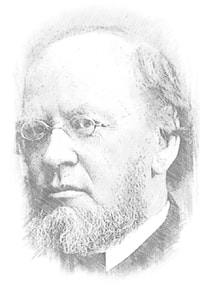
Archibald Alexander Hodge (July 18, 1823 – November 12, 1886), an American Presbyterian leader, was the principal of Princeton Seminary between 1878 and 1886. He was born in Princeton, New Jersey. He served as a missionary in India for three years (1847–1850). He held pastorates at Lower West Nottingham, Maryland (1851–1855), Fredericksburg, Virginia (1855–1861), and Wilkes-Barre, Pennsylvania (1861–1864). In 1864 he accepted a call to the chair of systematic theology in Western Theological Seminary (later Pittsburgh Theological Seminary) in Pittsburgh, Pennsylvania. There he remained until in 1877 he was called to Princeton to be the associate of his father, Charles Hodge, in the distinguished chair of systematic theology. He took on the full responsibilities of the chair of systematic theology in 1878. He died on November 12, 1886, in Princeton, New Jersey, from "a severe cold ... which settled in his kidneys".
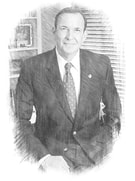 J Ligon Duncan
J Ligon Duncan
In the 19th century, theological liberalism undermined European and American confidence in the truthfulness and authority of Scripture. Amid that crisis, the theologians of Princeton turned to the Westminster Confession of Faith (1646). Men like A. A. Hodge and B. B. Warfield retrieved and reasserted Westminster’s doctrine of Scripture. That recovery informed a century of Protestant pastors and perhaps even foreshadowed and assisted the work of the International Council on Biblical Inerrancy at the end of the 20th century. --Ligon Duncan; Gospel Coalition; Westminster Confession of Faith: Faithful, Pastoral, Global, and Enduring 5.1.23
==rex humbard================
"People who claim that the days of miracles are over say they are "rightly dividing the word of truth." Friend, that is not dividing, that is subtracting" --Rex Humbard (Your Key to God's Bank).
==harley hunt================
Harley Don Hunt (February 1940 – October 2004) was an American Baptist pastor, politician, and denominational leader. Hunt served as associate pastor of First Baptist Church of Port Angeles, Washington (1966–1968) and as senior pastor of Gregory Heights Baptist (now Burien Community) Church in Seattle, Washington (1968–1974), Clearfield Community Church in Clearfield, Utah (1974–1983), Emerald Baptist Church in Eugene, Oregon (1983–1985), and Grace Baptist Church in Tacoma, Washington (1994–2004). Harley Hunt was executive director of the Ministers Council of American Baptist Churches USA from 1985 to 1993, based in Valley Forge, Pennsylvania.
==larry hurtado================
Larry Weir Hurtado (December 29, 1943 – November 25, 2019), was an American New Testament scholar, historian of early Christianity, and Emeritus Professor of New Testament Language, Literature, and Theology at the University of Edinburgh (1996–2011). He was the head of the School of Divinity from 2007 to 2010, and was until August 2011 Director of the Centre for the Study of Christian Origins at the University of Edinburgh.



